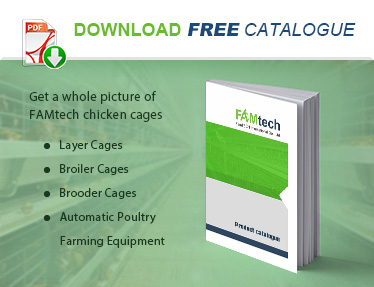A Beginner's Guide to Chicken Farming in South Africa
Overview of chicken farming
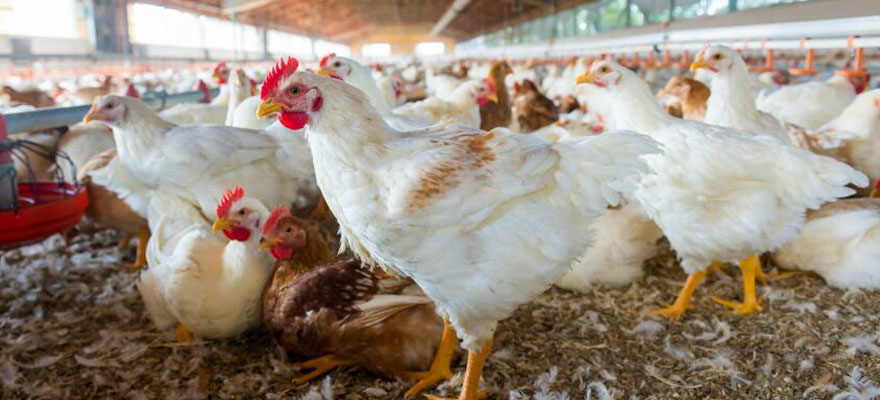
The process of growing chickens for a variety of purposes, including meat production and egg laying, is referred to as "chicken farming," also known as "poultry farming." Due to the enormous demand for chicken products, it is an agricultural industry that has become significantly more significant on a global scale. Chicken farming has become a successful business in South Africa, luring many people and business owners to the sector.
From hatching until market ready or egg production, a chicken's lifespan must be carefully managed at a chicken farm. It necessitates an expertise of marketing tactics, housing, nutrition, and health management. Depending on the size and objectives of the enterprise, different farming systems, such as free-range, intensive, or organic, might be adopted.
Importance of chicken farming in South Africa
The agricultural industry and economy of South Africa are highly dependent on chicken farming. Here are some primary arguments supporting its significance:
Economic contribution: The poultry sector, which includes chicken farming, makes a considerable contribution to the national economy. It sustains the livelihoods of numerous people involved in the production, processing, and distribution of it, especially in rural areas.
Food security: By supplying the rising demand for poultry products, chicken farming helps to ensure food security in South Africa. Being a popular and inexpensive source of protein, chicken flesh is a favorite in many homes. Eggs produced by chicken farms also increase the population's access to nutrient-rich food.
Rural development: Opportunities for rural development and poverty reduction exist in the poultry industry. Small-scale farmers and prospective business owners can participate in income-generating activities, improving their economic circumstances and promoting community growth.
Export potential: Potential exports include chicken meat and eggs, which are increasingly being exported by South Africa's poultry sector. International commerce has expanded due to high-quality goods and adherence to international standards, which has increased agricultural exports and foreign exchange revenues for the nation.
Industry multiplier effect: The development of allied businesses, such as the manufacture of animal feed, veterinary services, equipment, and transportation, is aided by the chicken farming sector. As a result, there is a multiplier effect that boosts economic activity and supports other value chain sectors.
Considering these factors, understanding the fundamentals and opportunities in chicken farming is crucial for beginners who aspire to start their own poultry businesses in South Africa. By delving into the intricacies of chicken farming, individuals can tap into a rewarding industry that aligns with the nation's agricultural landscape and market demands.
Getting Started with Chicken Farming
Types of chicken farming systems
It's crucial to comprehend the various farming systems offered before starting a chicken farming enterprise. These are the top three types:
Free-range farming: In this method, chickens are allowed to forage naturally and exercise outdoors without restriction. To safeguard the birds from predators and bad weather, sufficient area, fence, and shelter are needed.
Intensive farming: Chickens are raised in cramped conditions, usually indoors, in intensive systems such as battery cage system and slatted floor system. With regulated settings, automated feeding systems, and customized housing, these systems put a strong emphasis on increasing output efficiency.
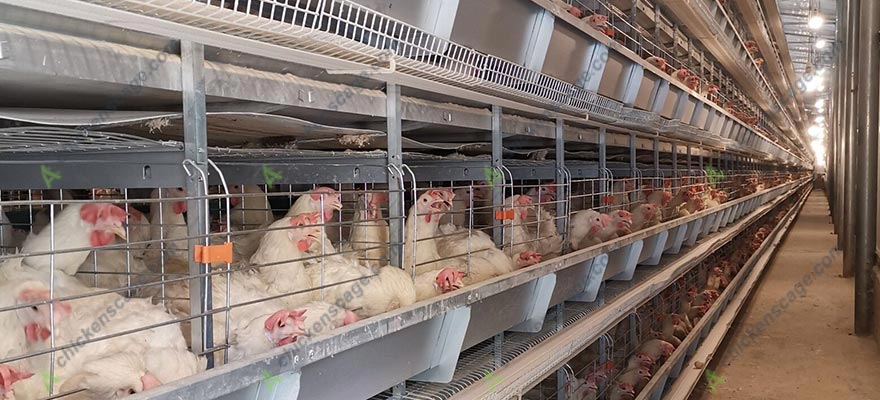
Organic farming: Organic poultry production adheres to stringent regulations that forbid the use of antibiotics, hormones, and artificial chemicals. Natural feed, access to outdoor spaces, and overall animal wellbeing are stressed.
Poultry breeds suitable for South Africa
The success of your chicken farming enterprise depends on your choice of poultry breed. Think about things like local availability, market demand, climate, and manufacturing objectives. Popular breeds of chicken that are appropriate for South Africa include:
Breeds designed specifically for the production of meat, such as broilers, grow quickly and convert feed into meat effectively.
Breeds of layers are renowned for having a high egg production rate. They are suitable for businesses that produce eggs.
Dual-purpose breeds: These varieties can produce both meat and eggs, giving farmers who want to diversify their businesses more flexibility.
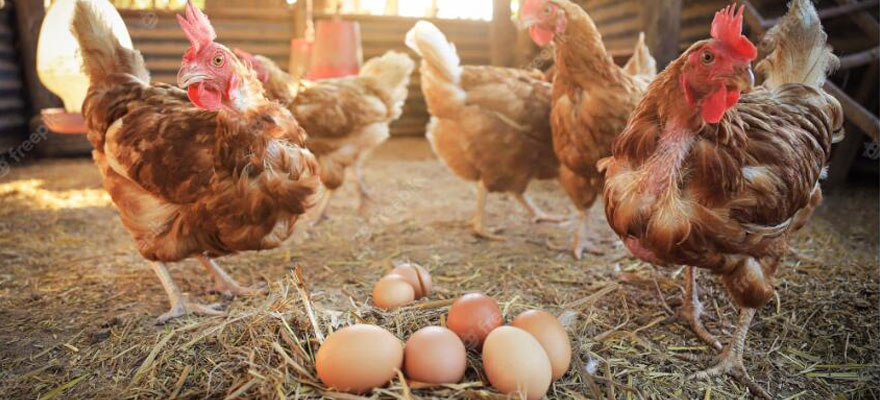
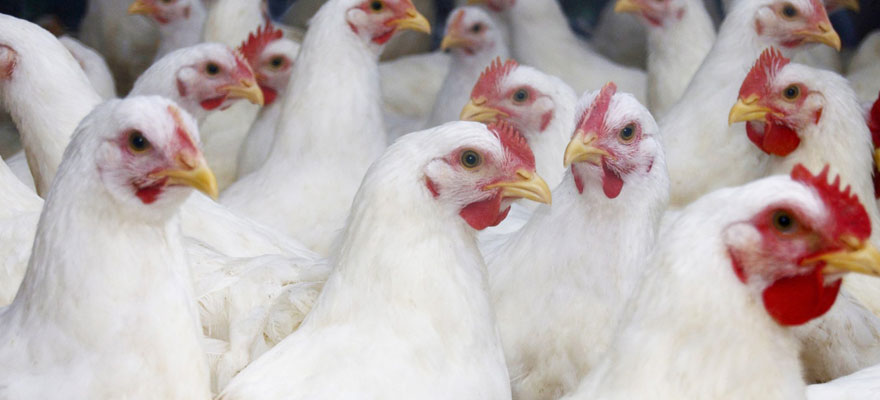
Identifying goals and objectives
Before starting your chicken farming business, clearly define your goals and objectives. Determine if you aim to focus on meat production, egg production, or both. Consider factors such as target markets, production volume, and growth projections.
Conducting market research
Thorough market research is essential to understand the demand for poultry products in your target area. Analyze market trends, consumer preferences, and competition. Identify potential customers, such as retailers, wholesalers, or direct consumers, and assess their requirements.
Financial considerations and budgeting
Create a comprehensive financial plan for your chicken farming business. Consider the costs involved in acquiring land, constructing housing and infrastructure, purchasing equipment, procuring chicks or hatching eggs, feed expenses, labor, veterinary services, and marketing. Develop a budget that accounts for both startup costs and ongoing operational expenses.
Additionally, explore potential sources of funding, such as loans, grants, or government programs, to support your venture.
Beginners can build a strong basis for their chicken farming enterprise in South Africa by comprehending the fundamentals of chicken farming systems, choosing suitable poultry breeds, and creating a sound business plan. These first actions lay the groundwork for later decisions about infrastructure, tools, and management techniques.
Setting Up Your Chicken Farm
Choosing a suitable site: The success of your poultry farm depends on where you decide to locate it. Think about the following elements:
Accessibility: Pick a site that is convenient for the transit of supplies, inputs, and outputs. Costs are kept to a minimum and effective logistics are ensured.
Market proximity is important since it has an impact on shipping costs and the freshness of your items. It might present better market chances to be near distribution centers or urban areas.
Resources are accessible: Make sure that you have access to necessities like water, electricity, and feed ingredients. Water supply that is adequate and dependable is crucial for chicken production.
Consider the local climate and weather while evaluating environmental issues. The health and productivity of your chickens might be impacted by extreme temperatures, humidity, or recurrent disease outbreaks.
Building infrastructure and housing
To create a comfortable environment for your chickens, it is essential to build sufficient infrastructure and housing. Think about the following elements:
Designing and constructing suitable chicken house in accordance with the farming method (free-range, intensive, or organic) is important. To encourage wholesome growth and production, make sure there is enough room, suitable ventilation, and insulation.
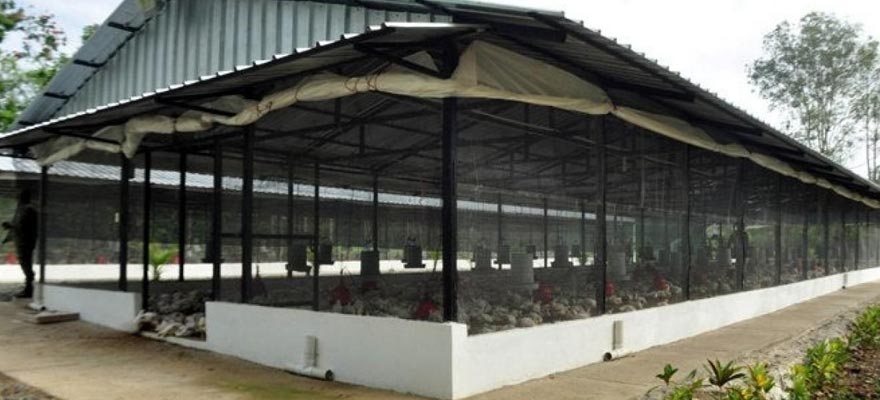
Security and safety: Take precautions to keep your chickens safe from predators, theft, and the spread of disease. To reduce dangers, put up fencing, protect your locks, and think about biosecurity procedures.
Areas for nesting and roosting: Give hens cozy boxes in which to lay their eggs. Install platforms or roosting poles for the chickens to sit on and relax.
To properly manage chicken dung, create a waste management system. If applicable, think about composting it or using it as agricultural fertilizer.
Procuring equipment and supplies
Equip your chicken farm with the necessary tools and supplies for smooth operations. Some essential equipment and supplies include:
Feeding and watering systems: Install appropriate feeders and waterers to ensure easy access to feed and water for your chickens. Choose equipment that is suitable for your chosen farming system.
Lighting and heating equipment: Provide adequate lighting for the desired photoperiod (daylight hours) to stimulate growth and reproduction. In colder climates, consider heating equipment to maintain optimal temperature conditions.
Handling and processing equipment: Depending on your business goals, invest in equipment such as egg incubators, egg graders, brooders, and slaughter equipment.
Feed and supplements: Identify reputable suppliers of quality poultry feed and supplements. Ensure a reliable and consistent supply to meet the nutritional needs of your chickens.
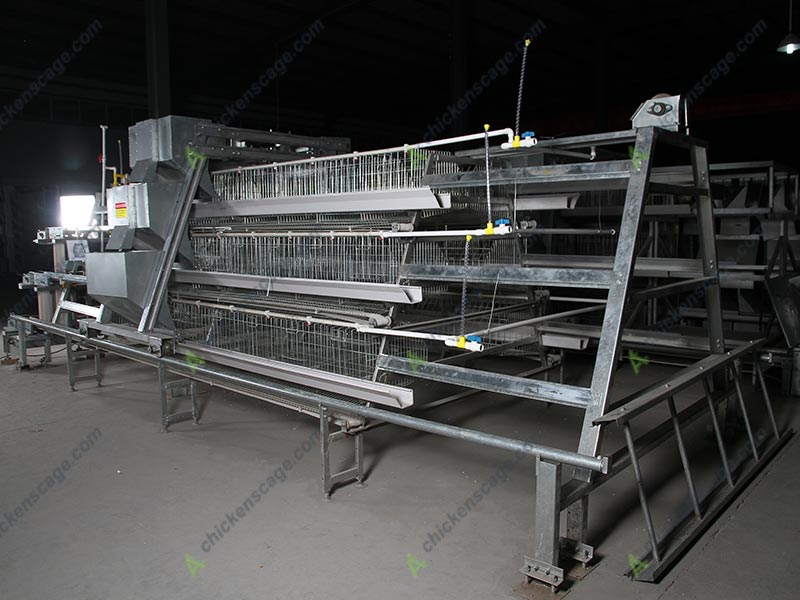

Ensuring biosecurity measures
To stop and stop the spread of diseases on your hen farm, biosecurity measures are crucial. Think about the following techniques:
Regulated access: Keep only authorized people on your farm. Implement biosecurity procedures for clients and staff, including cleaning and protective gear.
Disease prevention: Follow the immunization regimens advised by veterinarians and practice excellent cleanliness to prevent disease. To stop the spread of disease, quarantine fresh birds before integrating them into existing flocks.
Pest and predator control: Controlling pests and predators is essential if you want to prevent diseases from spreading to your flock of hens. Use effective pest control techniques and secure your chicken coop to keep out intruders.
Sanitation and hygiene: Keep the farm's surroundings tidy and hygienic. To reduce the danger of disease, regularly clean and disinfect your property, your equipment, and other areas.
By carefully selecting the location, constructing suitable infrastructure, procuring necessary equipment and supplies, and implementing biosecurity measures, you can establish a well-prepared and protected chicken farm. These steps contribute to the health, safety, and productivity of your chickens, ensuring a strong foundation for your business.
Breeding and Rearing Chickens
Selecting and sourcing day-old chicks
The success of your chicken farming enterprise depends on choosing the best day-old chicks. Think about the following elements:
Reputable suppliers: Purchase day-old chicks from licensed breeders or reputable hatcheries. Make sure they uphold strict guidelines for breed selection, wellbeing, and genetic quality.
Suitable breeds: Breeds that are appropriate: Choose chicken breeds in line with your production objectives and consumer preferences. Take into account elements like growth rate, egg output, disease resistance, and ability to adjust to regional conditions.
Health and vaccination: Make sure the day-old chicks are healthy and disease-free by checking their health and immunization records. Verify that they have gotten the necessary immunizations, including those for infectious bronchitis, Newcastle disease, and Marek's disease.
Creating a suitable brooding environment
The early stages of a chick's growth depend on proper brooding. Consider the following variables when creating a conducive brooding environment:
Setting up a brooder requires creating a spotless space with good ventilation, free of drafts, too much humidity, and predators. To keep the chicks at a comfortable temperature, use brooder lamps or other heating apparatus.

Rice hulls, wood shavings, or other suitable bedding materials are suggested. To make the bedding suitable for the chicks to walk on and rest on, it must be clean, dry, and pleasant.
Waterers and feeders should be placed near the brooder area and should be simple to access. To maintain a steady supply of clean water and a nutritious diet for the chicks, adjust their height to fit the growth of the birds.
Managing nutrition and feeding practices
Optimal growth and development of your chickens depend on proper diet. Follow these recommendations:
Feed that is well-balanced: Use chick starting food that has been specially prepared to meet the nutritional requirements of growing chicks. Make sure the diet is enriched with important nutrients such as proteins, vitamins, minerals, and amino acids.
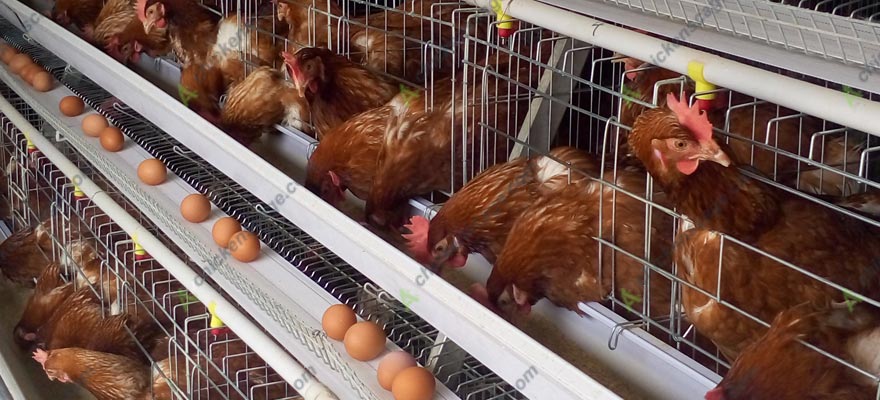
Feeding schedule: Offer a consistent and regular schedule of meals throughout the day. Follow the suggested feeding regimens for your particular breed and age of chicks.
Water availability: Make sure your chicks have a steady supply of clean, fresh water. Waterers should be frequently checked for contamination or dehydration.
Supplemental feeding: If necessary, speak with a veterinarian or poultry nutritionist to ascertain whether further additives or supplements are necessary to address particular nutrient deficits or medical issues.
Monitoring and addressing common health issues
For the purpose of avoiding and resolving common health disorders, routine assessment and proactive health management are crucial. Think about the following techniques:
Observation: Keep an eye out for any unusual behavior or symptoms in your chicks. Keep an eye out for signs including lethargy, loss of appetite, unusual feces, or respiratory trouble. Veterinarian support: Make contact with a vet who specializes in poultry and who can advise you on ways to maintain your flock's health and prevent sickness.
Follow the advised vaccination regimens to shield your chickens from the various diseases that are widespread in your area. Make sure that vaccinations are administered properly and on time by working with your veterinarian.
Implement stringent biosecurity procedures to stop the introduction and spread of disease. Limit access to your farm, maintain good hygiene, and avoid prolonged exposure to surroundings that could be polluted.
You may improve your hens' general health and lessen the effects of common health problems by carefully choosing and sourcing day-old chicks, setting up a proper brooding habitat, regulating nutrition and feeding habits, and monitoring the health of your chickens. Your chicken farming enterprise will be more successful and profitable if you regularly observe your flock and work with veterinarians.
.jpg)
Managing and Scaling Your Chicken Farm
Implementing effective flock management practices
Effective flock management is necessary for successful chicken farming. Apply the following strategies:
Record-keeping: Keep thorough logs on flock performance, including growth rates, feed intake, vaccination records, and medical histories. This data aids in decision-making by allowing for the tracking of advancements and the spotting of patterns.
Maintaining and enhancing biosecurity measures over time will help stop disease outbreaks. Follow specified immunization regimens, strictly enforce sanitary standards, and restrict access to the farm.
Regular observation: Keep a close eye on the flock to see any symptoms of illness, stress, or unusual behavior. Observe how much feed is being consumed, perform routine health checks, and handle any problems right away.
Ensuring that the chicken coop has sufficient ventilation and the right lighting conditions is important. The flock's general health and well-being are influenced by the proper air circulation and lighting schedules.
Optimizing growth and productivity
To maximize growth and productivity, consider the following strategies:
Nutrition optimization: Work with a poultry nutritionist to develop a balanced and customized feeding program for your specific flock. Adjust feed formulations based on growth stage, breed, and desired outcomes.
Water management: Monitor water quality and availability to ensure that chickens have access to clean water at all times. Proper hydration is crucial for growth and overall performance.
Disease prevention: Maintain strict biosecurity measures, follow vaccination protocols, and practice good hygiene to prevent disease outbreaks. Regularly consult with a veterinarian to address any health concerns promptly.
Genetic improvement: Consider selecting and breeding chickens with desirable traits, such as improved growth rate, egg production, or disease resistance. Work with reputable breeders or genetic programs to enhance the genetic quality of your flock.
.jpg)
Addressing challenges and minimizing risks
The chicken farming industry faces various challenges and risks. Mitigate these by:
Risk assessment: Identify potential risks and develop contingency plans to address them. Consider factors such as disease outbreaks, market fluctuations, extreme weather events, or feed price volatility.
Financial management: Maintain accurate financial records and regularly review your budget to track expenses and revenue. Build an emergency fund to handle unexpected costs and fluctuations in market conditions.
Market diversification: Explore multiple marketing channels to reduce dependency on a single customer or market segment. Consider selling directly to consumers, supplying local retailers, or participating in farmers' markets.
Continuous learning: Stay updated on industry trends, technological advancements, and best practices in chicken farming. Attend workshops, conferences, and training programs to enhance your knowledge and skills.
Expanding and diversifying your operations
If you intend to scale up or diversify your chicken farming business, consider the following steps:
Market analysis: Research market trends, customer preferences, and emerging opportunities. Identify potential niche markets or value-added products that align with your resources and capabilities.
Infrastructure expansion: Assess the need for additional housing, equipment, or infrastructure to support expansion. Ensure proper planning and budgeting to accommodate increased production capacity.
Operational efficiency: Streamline operations and optimize processes to maximize productivity. Identify areas for improvement, such as automation, improved feed conversion ratios, or enhanced waste management systems.
Business partnerships: Explore collaborations with other farmers, suppliers, or distributors to access new markets or leverage shared resources. Seek partnerships that align with your goals and complement your strengths.
By implementing effective flock management practices, optimizing growth and productivity, addressing challenges and minimizing risks, and considering expansion and diversification opportunities, you can successfully manage and scale your chicken farming business. Continual improvement, adaptation, and strategic decision-making are key to sustained growth and profitability.
Regulations and Compliance
Familiarizing yourself with legal requirements
Operating a chicken farming business requires compliance with various legal requirements. Familiarize yourself with the following aspects:
Agricultural and farming regulations: Research and understand the laws and regulations specific to poultry farming in South Africa. These may include zoning regulations, land use restrictions, environmental regulations, and animal welfare standards.
Food safety and labeling regulations: Ensure compliance with food safety regulations and labeling requirements when selling poultry products. Familiarize yourself with regulations related to processing, packaging, storage, and transportation of poultry products.
Employment laws: Understand labor laws and regulations related to employment, wages, working conditions, and occupational health and safety. Comply with legal obligations regarding worker rights, contracts, and fair employment practices.
Obtaining necessary permits and licenses
Make sure you are legally operating your poultry farming company by obtaining the necessary licences and licenses. Take the next actions:
Speak with the local government: To find out the permissions and licenses necessary for your particular site, contact the relevant municipal authorities or agricultural departments. They may offer details on the application procedure and any expenses that could be incurred.
Applications for licenses and permits: Submit all required paperwork as soon as possible. Permits for transportation, agriculture, waste management, land use, and water usage may all fall under this category.
Inspections for compliance: Be ready for regulatory agencies' compliance inspections. Make sure your farm and activities adhere to the listed standards and specifications.
Adhering to animal welfare and biosecurity standards
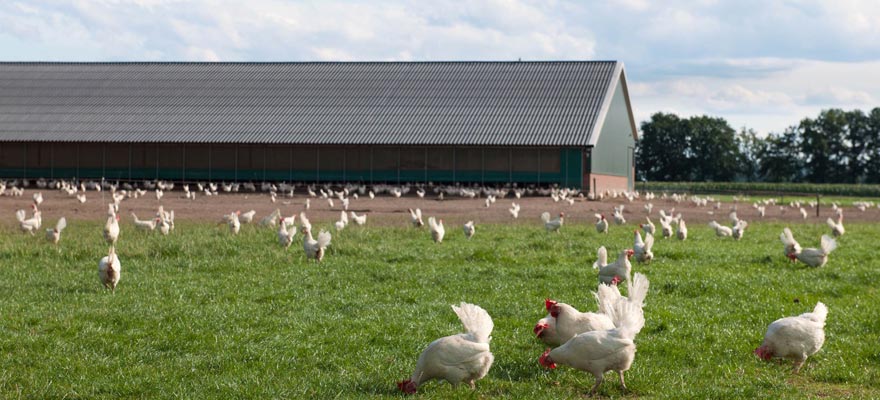
For the health of your hens and the avoidance of disease outbreaks, maintaining good standards for animal welfare and biosecurity is essential. Follow these recommendations:
Follow the norms and recommendations for animal care established by regional authorities or professional organisations. Make sure your hens have access to clean water, appropriate nourishment, and enough housing, ventilation, and space. Humanely handle and move birds, minimizing stress or injury.
To reduce the danger of disease transmission, implement and maintain strict biosecurity standards. Limit guest admittance, manage access to your farm, and set up hygienic amenities. Observe immunization schedules, keep an eye on the health of your flock, and deal with any illness or disease symptoms right away.
Keeping correct records is essential to ensuring the care of the animals. This includes keeping track of immunizations, feed and water quality, and any treatments given. These records let you keep tabs on the wellbeing and productivity of your flock while also providing documentation of compliance with biosecurity and animal welfare regulations.
Industry accreditations or certificates that attest to compliance with biosecurity and animal welfare requirements should be considered. These credentials might help you establish a better reputation and gain access to new markets or business opportunities.
You may assure regulatory compliance and advance ethical and sustainable chicken farming practices by being informed with legal requirements, getting required permits and licenses, and upholding animal welfare and biosecurity standards. You can choose aviary system to meet the demands of animal welfare regulations. The reputation and long-term success of your firm are influenced by operating within the law and upholding good standards.
Market Opportunities and Challenges
It's crucial to keep up with current market trends if you want to be successful in the poultry farming industry. Examine the upcoming elements:
Consumer demand: Recognize consumer preferences and shifting needs in the South African chicken industry. Think about things like locally sourced, antibiotic-free, organic, and free-range items.
Trends in health and wellness: Consider the rise in demand for chicken products that are viewed as natural, nourishing, and ethically produced, as well as the growing interest in better food options.
Determine the size of the South African chicken market and its potential for expansion. Keep an eye on demographic trends, urbanization rates, and economic indices that affect the consumption of poultry.
Identifying potential customers and distribution channels
Identify your target customers and the most effective distribution channels to reach them:
Retail markets: Explore partnerships with supermarkets, grocery stores, and specialty food retailers. Understand their requirements and develop strategies to supply products to meet their specific demands.
Restaurants and food service providers: Establish relationships with local restaurants, hotels, catering companies, and fast-food chains. Consider providing specific cuts or value-added products to cater to their needs.
Direct-to-consumer sales: Consider selling directly to consumers through on-farm sales, farmers' markets, online platforms, or community-supported agriculture (CSA) programs. Direct sales can provide opportunities for higher profit margins and closer connections with customers.
Assessing competition and market saturation
Analyze your competitors by finding any current poultry farms and businesses in your target region. Examine their techniques of production, price, selection of products, and market share. Develop a competitive advantage by being aware of their advantages and disadvantages.
Assess the degree of rivalry and market saturation in your particular location. Ascertain whether there is place for new competitors and whether there are any unmet needs or gaps in the market that you can fill.
Exploring niche markets and value-added products
Consider exploring niche markets and value-added products to differentiate your chicken farming business:
Organic and free-range: Respond to the growing demand for organic and free-range chicken products. Adhere to organic farming practices or implement systems that allow chickens to roam freely, providing added value to health-conscious consumers.
Specialty breeds: Explore breeding and raising specialty chicken breeds that have unique characteristics or flavors. These breeds can attract specific customer segments looking for unique culinary experiences.
Processed and value-added products: Consider diversifying your product offerings by processing and creating value-added chicken products such as marinated cuts, sausages, ready-to-cook meals, or chicken-based snacks. This allows for higher profit margins and access to different market segments.
Ethnic or cultural markets: Cater to specific ethnic or cultural markets by offering chicken products that align with their traditional dishes and cooking methods. This can create niche opportunities and loyal customer bases.
By analyzing market trends, identifying potential customers and distribution channels, assessing competition and market saturation, and exploring niche markets and value-added products, you can identify market opportunities and position your chicken farming business strategically. Continuously monitor market dynamics and adapt your strategies to stay competitive and capitalize on emerging trends.
Future Prospects and Development Trends
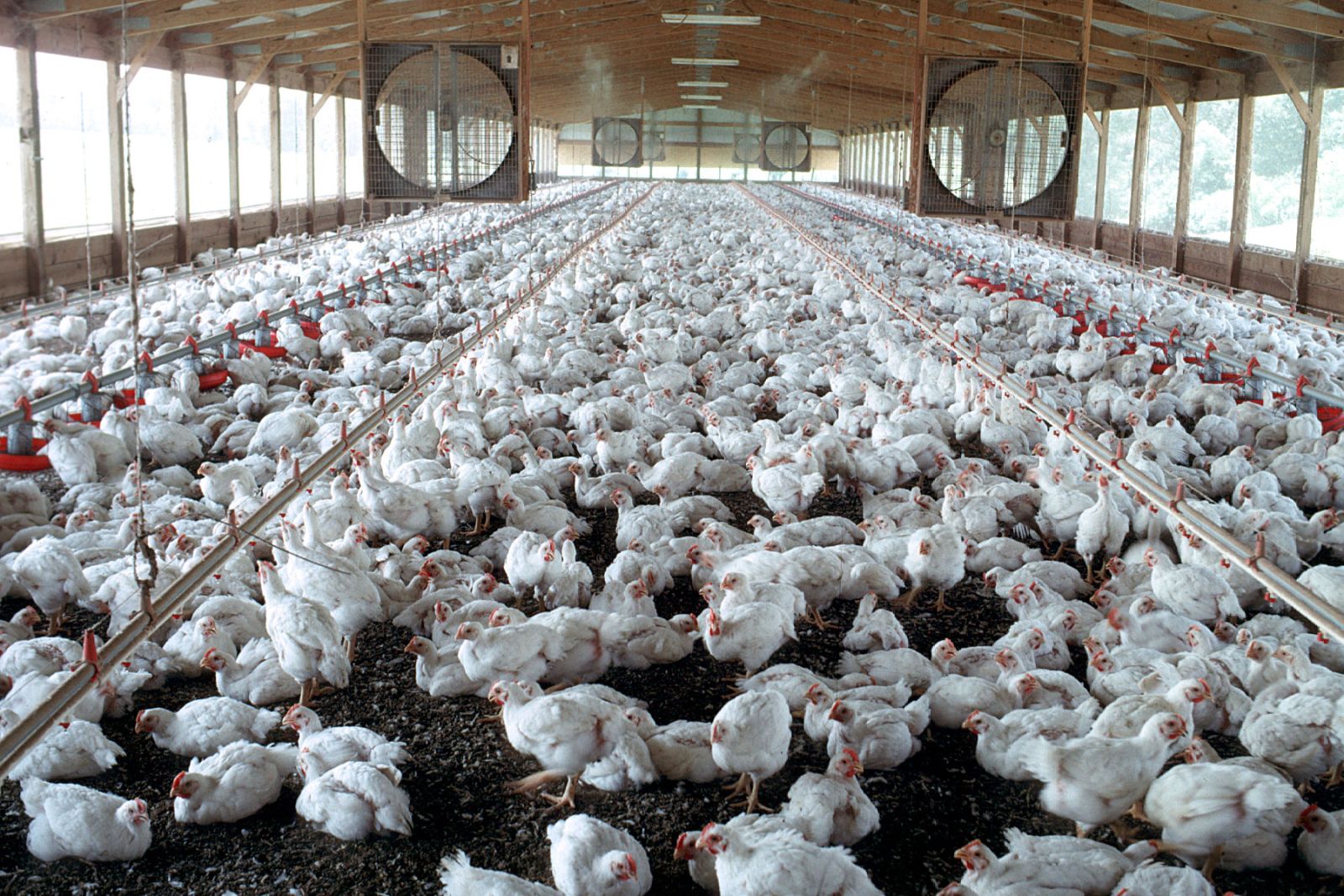
Technological advancements in chicken farming
The future of chicken farming will be shaped by technological advancements that improve efficiency, productivity, and animal welfare:
Automation and robotics: Expect increased use of automated systems for tasks such as feeding, watering, and waste management. Robotics may play a role in egg collection, sorting, and monitoring flock health.
Precision farming: Precision technologies, such as sensors and data analytics, will enable precise monitoring of environmental conditions, feed consumption, and health parameters. This data-driven approach will optimize resource utilization and decision-making.
Genetic advancements: Continued genetic research and selective breeding programs will lead to improved traits in chickens, such as faster growth rates, enhanced disease resistance, and higher egg production.
Sustainable and organic farming practices
The focus on sustainability and organic practices will continue to shape the future of chicken farming:
Organic and free-range production: Consumer demand for organic and free-range chicken products is expected to grow. Farmers may adopt organic farming practices, prioritize animal welfare, and reduce the use of antibiotics and chemicals.
Environmental sustainability: Sustainable farming practices, such as efficient water and energy use, waste management systems, and renewable energy sources, will be increasingly important for reducing the environmental impact of chicken farming.
Regenerative agriculture: The adoption of regenerative agriculture principles, such as rotational grazing, cover cropping, and soil health management, can improve soil fertility, biodiversity, and carbon sequestration.
Consumer preferences and demands
The future of the chicken farming sector will be shaped by consumer tastes and demands:
Consumers are becoming more concerned about animal welfare and are looking for items from chicken farms that prioritize humane treatment of the birds.
Health-conscious choices: As consumers emphasize healthier options, the demand for chicken products free of antibiotics, hormones, and genetically modified organisms (GMOs) will continue to increase.
Consumers are calling for more openness in the food supply chain and traceability. A competitive edge will go to farms that can offer traceability, information on production methods, and sustainable sourcing.
Government support and initiatives
Government assistance and efforts will have an impact on the future development of the chicken farming industry:
Governments may give resources for research and development in areas such as genetics, nutrition, and disease control to assist the industry's growth and sustainability.
Regulatory frameworks: Governments may enact legislation to protect animal welfare, food safety, and the environment. Long-term success will need adherence to these regulations.
Governments may invest in training and education programs to provide farmers with the knowledge and skills they need to adapt to shifting industry trends and technological breakthroughs.
By embracing technological advancements, adopting sustainable and organic farming practices, understanding consumer preferences, and leveraging government support and initiatives, chicken farmers can position themselves for success in the future. Flexibility, innovation, and a focus on meeting evolving consumer demands will be key to thriving in the ever-changing landscape of the chicken farming industry.
Conclusion
In this post, we looked at the fundamentals of chicken farming in South Africa and offered helpful tips for those thinking about opening a poultry company. We touched on the significance of chicken farming in the nation as well as its current state and future prospects.
We discussed important topics like knowing the various agricultural techniques and the best breeds of chicken for South Africa. We stressed the significance of creating a business strategy that involves defining objectives, performing market research, and taking financial factors into account.
Then, we went into detail on how to set up a chicken farm, including picking the best area, constructing the necessary buildings and infrastructure, buying the necessary tools and materials, and making sure biosecurity precautions are in place. It also covered how to breed and raise chickens, with a focus on choosing and obtaining day-old chicks, setting up acceptable brooding habitats, controlling nutrition and feeding techniques, and dealing with common health concerns.
Additionally, we offered advice on running and expanding a chicken farm, putting in place efficient flock management techniques, maximizing growth and production, addressing difficulties and lowering risks, and growing and diversifying activities.
While this article provides a comprehensive overview, it is crucial for beginners to engage in further research and learning. There are numerous resources available, including books, online courses, agricultural extension services, and industry associations that offer valuable information and guidance tailored to specific regions and farming practices. Investing time in continuous learning will enhance your knowledge and increase your chances of success in the chicken farming business.
Chicken farming presents a promising opportunity for entrepreneurs. By starting a chicken farming business and employing the knowledge and best practices discussed in this article, you can embark on a rewarding journey in agriculture. The industry's future prospects, driven by technological advancements, sustainable practices, evolving consumer demands, and government support, provide a fertile ground for entrepreneurship and success.
Remember to remain adaptable, keep an eye on market trends, and stay committed to providing high-quality products while prioritizing animal welfare, sustainability, and consumer satisfaction. With dedication, hard work, and a passion for chicken farming, you can achieve your goals and build a thriving and profitable business in this dynamic industry.
Good luck on your journey into the world of chicken farming in South Africa!

 A 5-tier H type layer cage system installed in West Africa
A 5-tier H type layer cage system installed in West Africa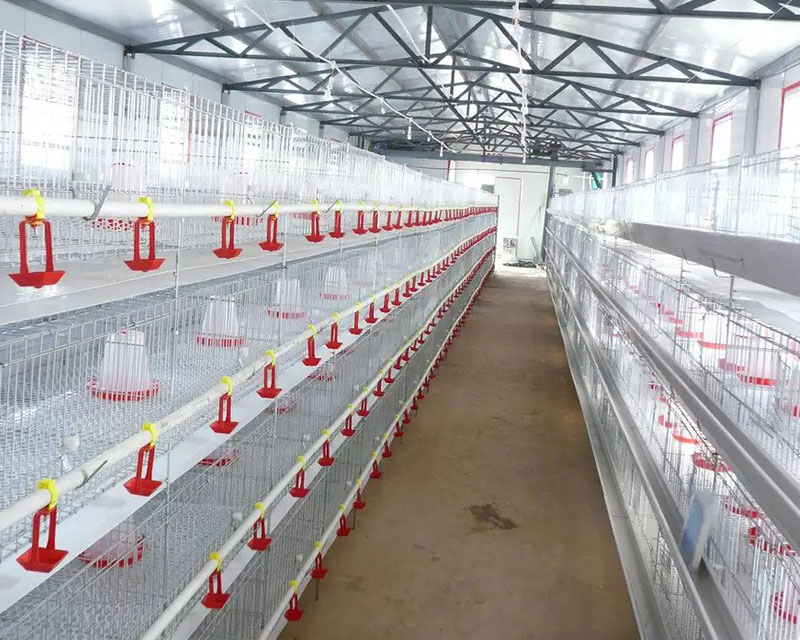 4 Tier H Type Broiler Cage Project In South Africa
4 Tier H Type Broiler Cage Project In South Africa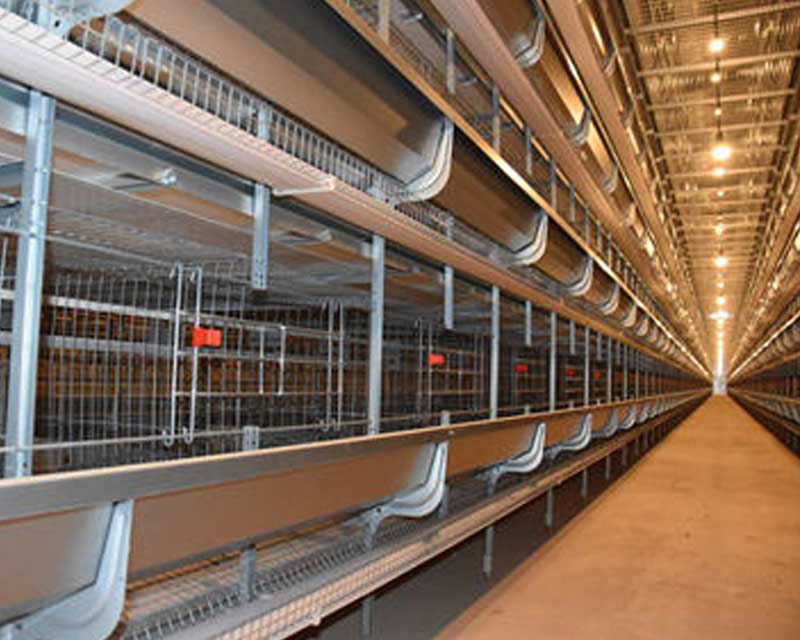 Layer Cage Project In Cuba
Layer Cage Project In Cuba H Type Layer Cage Project In Southeast Asia
H Type Layer Cage Project In Southeast Asia A Type Layer Cage Installed In West Africa
A Type Layer Cage Installed In West Africa Nigeria H Type Layer Cage Project
Nigeria H Type Layer Cage Project